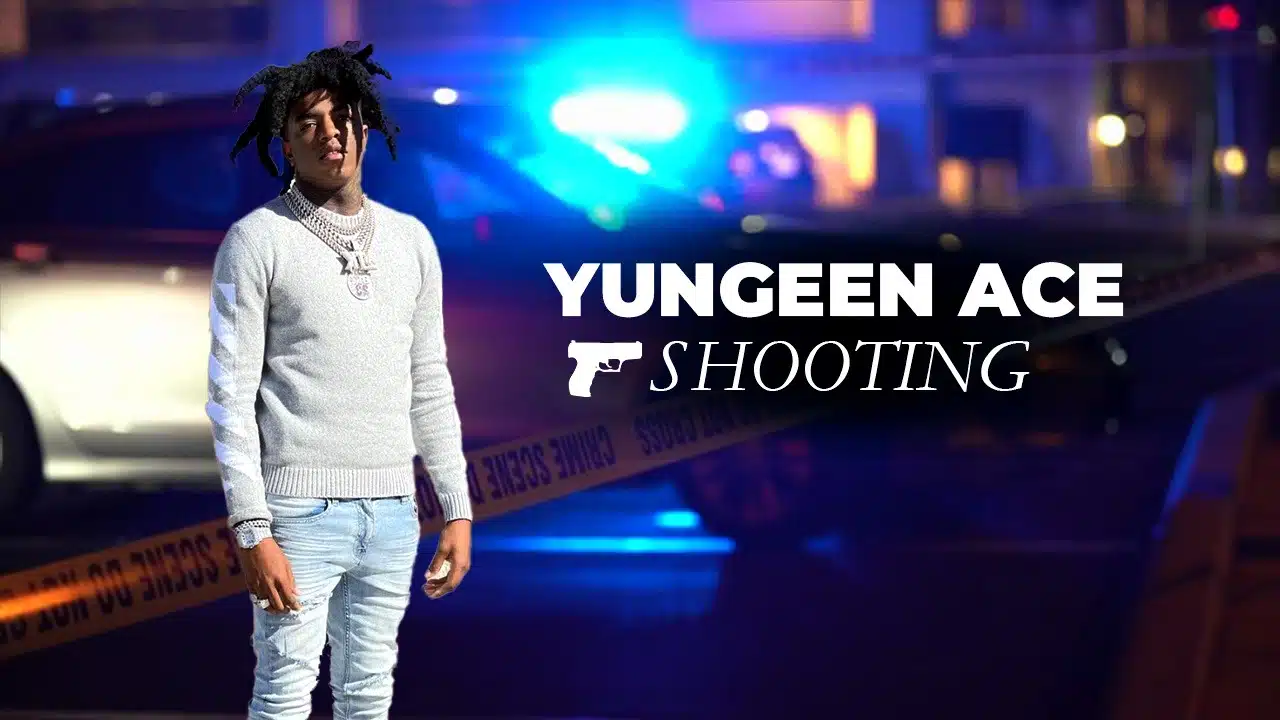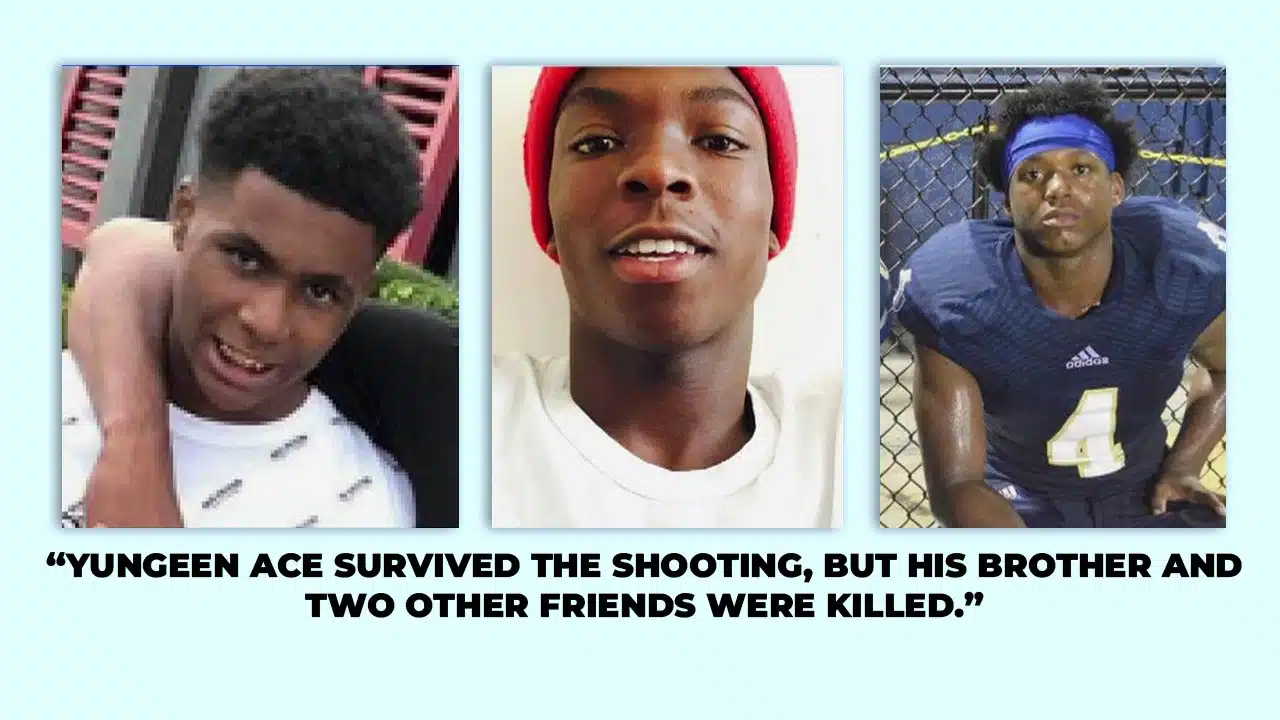Understanding the impact of gun violence on lives and communities can be tough. People often search for stories of survival to find hope. The Yungeen ace shooting in Jacksonville, Florida, is one such story that sheds light on this dark subject.
In 2018, Yungeen Ace was shot but survived a violent event that took three lives, including his brother’s. This fact alone offers a glimpse into the struggles he faced and overcame.
Our article aims to explore how Yungeen Ace dealt with this life-changing incident—physically, legally, and emotionally—and how it influenced his music and public stance against violence.
You will learn about resilience in the face of tragedy.
Stay tuned for an inspiring journey.
Early Career and Initial Success
Yungeen Ace began his music journey after losing his uncle at 13. This loss pushed him to start making songs. He grew up in Jacksonville, Florida, where he found the beats and rhythms of street life.
In 2018, he dropped his first big project, “Life of Betrayal.” This mixtape featured hits with YoungBoy Never Broke Again. It quickly got fans listening.
His third mixtape, “Step Harder,” came out later and reached number 81 on the Billboard 200 chart. Songs like “Opps” and “Who I Smoke” became very popular. They even earned RIAA Gold certification.
These early wins showed Yungeen Ace was a new force in rap music.
The 2018 Yungeen Ace Shooting Incident
In 2018, Yungeen Ace faced a terrifying event. Gunfire erupted, leaving him wounded and fighting for life.
Details of the event
On June 5, 2018, a tragic event took place in Jacksonville, Florida. Yungeen Ace and his friends were attacked. During this attack, Yungeen Ace got hit by bullets eight times. Sadly, three of his close ones did not make it.
His brother Trevon Bullard and two friends, Jercoby Groover and Royale D’Von Smith Jr., all younger than 20 years old, died.
The shooting shocked people everywhere. Fans of Yungeen Ace and others from the music world, like Boosie Badazz felt the pain too. This event became big news across social media. People talked about it a lot online and in person.
Immediate aftermath and impact on Yungeen Ace
After the shooting, Yungeen Ace faced hard times. He lived with PTSD. This means loud noises and sudden movements scared him a lot. He also felt guilty for surviving when others did not.
Thinking about how fast things can change became part of his daily life.
His tough childhood made things harder for him to deal with this new pain. Growing up, Ace only had his mom and 11 brothers at home. Some of his family members spent many years in jail.
These experiences shaped how he saw the world after the shooting. They made him think more about life and its many surprises.
Legal Challenges and Public Reaction
After the shooting, Yungeen Ace faced many legal issues. People and news talked a lot about it.
Legal issues following the shooting
Yungeen Ace had tough times with the law after the shooting. He spoke about how police in Florida treat rappers harshly. This came to light more when he got into another shooting on March 10, 2019, in Waycross, Georgia.
His friend Jeremy Brookins, also known as Ralo, died in this event. The incidents put Ace under a lot of legal watch.
The rapper’s troubles didn’t end there. He faced questions and had to deal with courts because of these shootings. It showed how serious situations can get tangled with law issues for artists like him.
Ace’s experiences highlight the complex link between music stars and legal matters they often face.
Public and media response
The media and public took a lot of interest in Yungeen Ace’s story after the shooting. News outlets covered his survival. They talked about how he lost close friends that day. This grabbed people’s attention everywhere.
Fans felt sad for him. They also admired his strength.
Yungeen Ace used this time to speak up about gun violence on shows like “Big Facts.” He wanted to make a change with his voice and music. People saw him as someone who got through tough times but still fought back against violence in communities.
This made more people listen to what he had to say about peace and safety.
Yungeen Ace’s Recovery and Resilience
After the shooting, Yungeen Ace faced a tough road to recovery. He worked hard, both in body and mind, to get back on his feet.
Physical and emotional recovery process
Yungeen Ace faced a challenging path towards recuperation following the shooting incident. Prioritizing his health was his main focus to improve. His music became an integral part of his healing process.
Tracks such as “Opps” and “Who I Smoke” are reflections of his ability to manage pain and progress. The act of creating music facilitated the expression of emotions and dealing with trauma.
Additionally, he prioritized mental health, recognizing it as crucial to achieving complete recovery. Ace believed in the significance of discussing hardships and acquiring support.
This methodology was beneficial in healing not just his physical injuries but also in fortifying him emotionally. Along this path, Ace discovered coping mechanisms related to his ordeal and utilized his experience as fuel for personal growth and artistic development.
How the incident influenced his music and public image
The shooting changed his music a lot. After that day, Yungeen Ace’s songs started to talk more about his pain and survival. He shared stories of losing friends and facing tough times in albums like “Life of Betrayal 2x” and “Survivor of the Trenches.” His work with artists like Kodak Black and Boosie Badazz also got deeper.
He didn’t just rap about violence; he showed how it hurt people and communities.
People saw him differently too. Fans admired how strong he was for coming back after the shooting. They listened closely when he talked about stopping violence in interviews. By using his voice, Yungeen Ace influenced others to think more about peace and understanding through music.
This made both his fans and other musicians respect him even more.
Yungeen Ace’s Perspective on Violence and Survival
[Video Credit @revolt]
Yungeen Ace speaks out about the harsh reality of gun violence and its effects on people. He uses his voice to inspire change, pushing others toward a path of peace over aggression.
His views on gun violence and its impact on communities
Gun violence hurts people. It makes communities live in fear. The rapper knows this too well. He talks about how guns and shootings change places where kids grow up.
He wants to show young people a better path. Using his voice, he tells others about the pain of losing friends and the struggle to stay positive. Social media can make violence look cool, but he fights that idea.
He uses his music and stories to teach kids about making good choices.
Efforts to use his experience to influence others positively
Yungeen Ace wants to help people with his story. He talks about how hard life was after the shooting and uses music to share his message. His songs talk about stopping gun violence and making better choices.
People listen because he knows what pain feels like.
He also dreams of winning Grammys by age 34 and starting a record label. This shows others they can change their lives too, no matter where they start from. Yungeen Ace works to give a peaceful life for his family, proving success comes from hard work, not violence.
Takeaways
This story shows us how Yungeen Ace faced a tough time. He got shot but lived despite Yungeen Ace shooting incident. People close to him did not make it. This hurt him a lot. After the shooting, he had legal problems and many people talked about it.
Yet he kept going strong. He worked on getting better in body and mind. His songs now tell his story of pain and hope.
Ace looks at gun violence with sad eyes. He wants less of it in places where people live together closely. Through music, he tries to lead others to do better.
We learn from him that even when bad things happen, we can stand up again. We also see the power of sharing our stories through art or talk can heal us.
Let’s think about what we can do too. Can we help stop violence? Maybe share our own stories like Ace does?
His journey tells us something big—life is hard but hope is real.





































